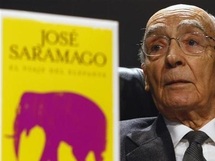
Portuguese Nobel literature laureate Jose Saramago in 2009
He died on Friday on the Spanish Canary island of Lanzarote at the age of 87, prompting the government to announce two days of national mourning.
His remains arrived in Lisbon on a Portuguese military aircraft accompanied by his wife, Spanish journalist Pilar del Rio, his daughter Violante, and Portugal's Minister of Culture, Gabriela Canavilhas.
Around 30 close friends and admirers were waiting on the tarmac at a military base in Lisbon for the arrival of the aircraft. His coffin was covered in a Portuguese flag, a symbol of the reconciliation between the nation and its prodigal son.
Hundreds of people, including Prime Minister Jose Socrates and members of his government, later filed past his coffin at a temporary chapel of rest at Lisbon's city hall.
Some carried a red carnation, the symbol of the 1974 revolution that brought an end to the dictatorship of Antonio Salazar.
Cuban leader Raul Castro and his brother Fidel Castro were among those to send flowers.
Saramago, whose works included "Baltasar and Blimunda", "The Gospel According to Jesus Christ" and "Blindness", died peacefully following a long illness, his foundation said.
In 1993 Saramago had left Portugal for the Canary Islands following the controversy surrounding "The Gospel according to Jesus Christ", in which he portrayed Jesus losing his virginity with Mary Magdalene.
Denouncing the work as an attack on Portugal's religious heritage, the government removed Saramago's name from a list of candidates for the European Literary Prize, provoking his "exile".
President Anibal Cavaco Silva, who was prime minister at the time, was one of the first to pay tribute to Saramago Friday, saying he left a vast body of work that "must be read and understood by generations to come".
Brazilian President Luiz Inacio Lula da Silva, Spanish Prime Minister Jose Luis Zapatero and French Foreign Minister Bernard Kouchner led international tributes.
Saramago, who described himself as a "libertarian Communist", was an ardent defender of the poor and oppressed, and a supporter of the Palestinian and Western Sahara causes.
He said he wrote to understand a world which he described as "the seat of hell".
The Vatican's newspaper, l'Osservatore Romano, had few kind words for the writer, calling him "an anti-religious ideologue" and "populist extremist" in an editorial in its Sunday edition.
Born November 16, 1922 in Azinhaga, a village in central Portugal, Saramago published more than 30 works over 60 years, including novels, poetry, essays and plays.
Despite being weakened by his illness, at the time of his death Saramago was working on "a novel of ideas, on the brutality of war", of which he had written about 20 pages, said his Portuguese editor, Zeferino Coelho.
His body will lie in the temporary chapel of rest until his funeral Sunday. The government on Friday declared two days of official mourning.
His ashes will be scattered in Azinhaga and in Tias, the part of Lanzarote where he spent his last 17 years, his wife Pilar del Rio told AFP.
---------------------------------------------------------------------------
His remains arrived in Lisbon on a Portuguese military aircraft accompanied by his wife, Spanish journalist Pilar del Rio, his daughter Violante, and Portugal's Minister of Culture, Gabriela Canavilhas.
Around 30 close friends and admirers were waiting on the tarmac at a military base in Lisbon for the arrival of the aircraft. His coffin was covered in a Portuguese flag, a symbol of the reconciliation between the nation and its prodigal son.
Hundreds of people, including Prime Minister Jose Socrates and members of his government, later filed past his coffin at a temporary chapel of rest at Lisbon's city hall.
Some carried a red carnation, the symbol of the 1974 revolution that brought an end to the dictatorship of Antonio Salazar.
Cuban leader Raul Castro and his brother Fidel Castro were among those to send flowers.
Saramago, whose works included "Baltasar and Blimunda", "The Gospel According to Jesus Christ" and "Blindness", died peacefully following a long illness, his foundation said.
In 1993 Saramago had left Portugal for the Canary Islands following the controversy surrounding "The Gospel according to Jesus Christ", in which he portrayed Jesus losing his virginity with Mary Magdalene.
Denouncing the work as an attack on Portugal's religious heritage, the government removed Saramago's name from a list of candidates for the European Literary Prize, provoking his "exile".
President Anibal Cavaco Silva, who was prime minister at the time, was one of the first to pay tribute to Saramago Friday, saying he left a vast body of work that "must be read and understood by generations to come".
Brazilian President Luiz Inacio Lula da Silva, Spanish Prime Minister Jose Luis Zapatero and French Foreign Minister Bernard Kouchner led international tributes.
Saramago, who described himself as a "libertarian Communist", was an ardent defender of the poor and oppressed, and a supporter of the Palestinian and Western Sahara causes.
He said he wrote to understand a world which he described as "the seat of hell".
The Vatican's newspaper, l'Osservatore Romano, had few kind words for the writer, calling him "an anti-religious ideologue" and "populist extremist" in an editorial in its Sunday edition.
Born November 16, 1922 in Azinhaga, a village in central Portugal, Saramago published more than 30 works over 60 years, including novels, poetry, essays and plays.
Despite being weakened by his illness, at the time of his death Saramago was working on "a novel of ideas, on the brutality of war", of which he had written about 20 pages, said his Portuguese editor, Zeferino Coelho.
His body will lie in the temporary chapel of rest until his funeral Sunday. The government on Friday declared two days of official mourning.
His ashes will be scattered in Azinhaga and in Tias, the part of Lanzarote where he spent his last 17 years, his wife Pilar del Rio told AFP.
---------------------------------------------------------------------------









 Home
Home Politics
Politics









